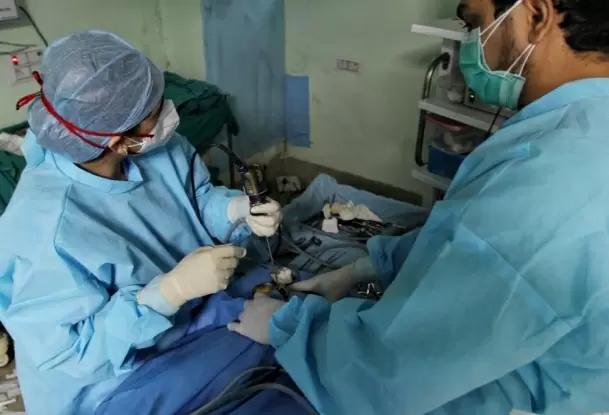'Uncontrolled diabetes, improper steroid use major factors for black fungus'
Chandigarh
05-June-2021

Photo: IANS
In the first evidence-based multi-centre study on mucormycosis (black fungus) in India, doctors at the PGIMER here said on Saturday that uncontrolled diabetes and improper use of steroid were the major factors for its emergence.
However, they said the study could not look into the role of the Covid-19 virus in causing immunity disturbance leading to mucormycosis.
Already more than 20,000 cases have been reported across India, Arunaloke Chakrabarti, Professor and Head, Department of Medical Microbiology, PGIMER, said.
In the MucoCovi network study, 16 healthcare centres participated to provide detailed information about proven mucormycosis cases with and without Covid-19 infection from September 1 to December 31, 2020.
The prevalence of Covid associated mucormycosis (CAM) was 0.27 per cent in patients managed in hospital wards and 1.6 per cent in patients managed in ICUs.
There was a 2.1-fold rise in mucormycosis cases during 2020 in India compared to 2019 and the research suggests that this increase is attributable to the pandemic.
The mortality of the mucormycosis is much higher than Covid-19 infection. An early diagnosis and prompt management may save the patient.
Watch This TWL Video
The emergence of mucormycosis is not new during the second wave. Even during the first wave last year, doctors of leading institutes of the country noted the rise of the number of mucormycosis cases. They were curious to know the reason of the emergence of mucormycosis.
Led by doctors at the Postgraduate Institute of Medical Education and Research (PGIMER), a study was conducted with the name of MucoCovi (Muco from mucormycosis and Covi from Covid) study at 16 centres.
The study results were published on Friday in the Emerging Infectious Disease Journal.
Chakrabarti said it was seen that on an average CAM diagnosis was made 18 days after Covid-19 infection. The most common sites of infection were found to be nose with eye involvement (in 58 per cent cases) followed by nose with eye and brain involvement (27 per cent) and then lung infection (nine per cent cases).
It shows a considerable number of patients reported late to the hospital after the disease progression to the brain. Besides, facial pain, nasal blockage and discharge; toothache and loosening of teeth were seen in a high number of cases for the first time.
On comparing the cases of CAM with mucormycosis without Covid-19 (i.e. non-CAM) it was seen that uncontrolled diabetes mellitus was the most common underlying disease in both groups.
In patients with CAM, newly detected diabetes mellitus was more frequent compared to non-CAM cases (20.9 per cent versus 10 per cent). This suggests the direct role of Covid-19 in causing or worsening diabetes, which may predispose these patients to mucormycosis.
In fact, patients with diabetic ketoacidosis developed CAM early i.e. in less than eight days of Covid-19. On the other hand, those patients who developed CAM later had mostly received steroid treatment.
It was seen that inappropriate use of steroids (63.3 per cent) i.e. either in very high doses or use in patients who did not need it was associated with development of late CAM, i.e. more than eight day after Covid-19 diagnosis.
The overall death rate due to mucormycosis (both CAM and non-CAM) was 38.3 per cent at six weeks and 45.7 per cent after 12 weeks of illness, said the study.
It was seen that patients less than 54 years of age, those with brain or lung involvement and those who had to undergo ICU admission had a higher risk for death.
The authors conclude that the Covid-19 pandemic has resulted in a rise in cases of mucormycosis from India. Mucormycosis is a critical problem complicating the later part of the clinical course of Covid-19 in India due to improper glucocorticoid usage.
Considering the gaps in the study, the doctors have planned another large-scale multicentre study at 30 centres of the country. They say the study results are likely within the next three months. - IANS
More Headlines
Air India Crash: SC Says No One Can Blame Pilot, Seeks Centre’s Response
PM Modi Launches Year-Long Celebration Of 150 Years Of Vande Mataram
Heavy rain forecast across TN till Nov 11, schools shut in Tirupattur today
Mamdani ‘excited’ to be immigrant mayor
Ready With Guitar, Jemimah Invites Sunil Gavaskar To Sing Together
Air India Crash: SC Says No One Can Blame Pilot, Seeks Centre’s Response
PM Modi Launches Year-Long Celebration Of 150 Years Of Vande Mataram
Heavy rain forecast across TN till Nov 11, schools shut in Tirupattur today
Mamdani ‘excited’ to be immigrant mayor
Ready With Guitar, Jemimah Invites Sunil Gavaskar To Sing Together









